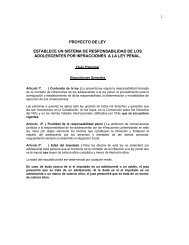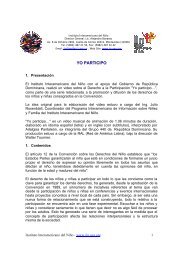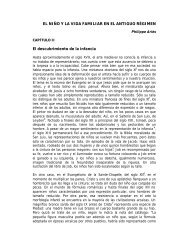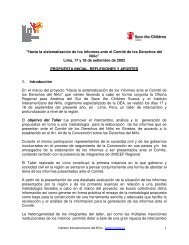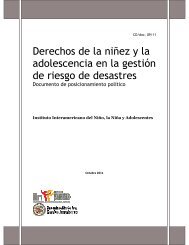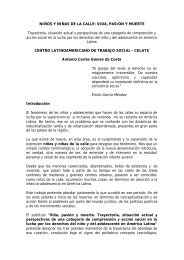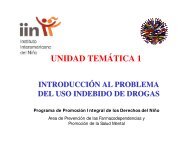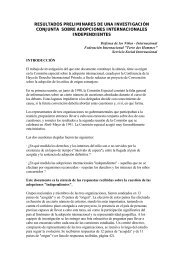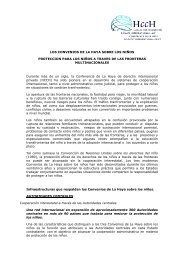- Page 1 and 2:
WORLD REPORT ONviolence against chi
- Page 3 and 4:
The designations employed and the p
- Page 5:
IVNature and extent of the problem
- Page 8 and 9:
I would like to thank the generous
- Page 10:
the University of Alberta, Canada;
- Page 13:
XII
- Page 17 and 18:
primary obligation to prevent viole
- Page 19 and 20:
sultations that were facilitated by
- Page 21 and 22:
UNICEF/HQ 05-1826. Giacomo PirozziU
- Page 23 and 24:
An end to violence against children
- Page 25 and 26:
“Children are not mini-human bein
- Page 27 and 28:
“There is a large gap between wha
- Page 29 and 30:
“Throughout history some children
- Page 31 and 32:
“Violence against children is a s
- Page 33 and 34: “I hate being a child, I hate bei
- Page 35 and 36: 14ity, the short- and long-term rep
- Page 37 and 38: “Nations will not prosper if thei
- Page 39 and 40: “This study provides a comprehens
- Page 41 and 42: 20An end to violence against childr
- Page 43 and 44: “Ending violence against children
- Page 45 and 46: “All of our proposals are achieva
- Page 47 and 48: 26An end to violence against childr
- Page 49 and 50: UNICEF/HQ05-1931. Roger LemoyneHAIT
- Page 51 and 52: 30Violence against children and int
- Page 53 and 54: “I really believe there is nothin
- Page 55 and 56: “Children are betrayed every day
- Page 57 and 58: “In bringing to light the many is
- Page 59 and 60: “Fundamental rights, children rig
- Page 61 and 62: Regional treaties relevant to viole
- Page 63 and 64: 42Violence against children and int
- Page 65 and 66: UNICEF/HQ01-0432. Claudio VersianiB
- Page 67 and 68: 46Violence against children in the
- Page 69 and 70: “The Study marks a watershed in a
- Page 71 and 72: “I was forced to marry with an ol
- Page 73 and 74: “One day I went to put the cows t
- Page 75 and 76: 54Violence against children in the
- Page 77 and 78: “I was just 15 years old and was
- Page 79 and 80: “I hate early marriage. I was mar
- Page 81 and 82: 60Violence against children in the
- Page 83: FIGURE 3.2The prevalence of FGM amo
- Page 87 and 88: “It could appear a feeling of gui
- Page 89 and 90: “When the head of the household h
- Page 91 and 92: “Some of our parents fight in fro
- Page 93 and 94: 72Violence against children in the
- Page 95 and 96: 74Violence against children in the
- Page 97 and 98: The Swedish experience with prohibi
- Page 99 and 100: 78Violence against children in the
- Page 101 and 102: 80Violence against children in the
- Page 103 and 104: of forced displacement, women’s i
- Page 105 and 106: 84Violence against children in the
- Page 107 and 108: A multisectoral approach to compreh
- Page 109 and 110: “I think child abuse happens a lo
- Page 111 and 112: 90Violence against children in the
- Page 113 and 114: Improving the knowledge base in Ind
- Page 115 and 116: 94Violence against children in the
- Page 117 and 118: 96Violence against children in the
- Page 119 and 120: 98Violence against children in the
- Page 121 and 122: 100Violence against children in the
- Page 123 and 124: 102Violence against children in the
- Page 125 and 126: 104Violence against children in the
- Page 127 and 128: 106Violence against children in the
- Page 129 and 130: UNICEF/HQ06-0881. Mariella FurrerSu
- Page 131 and 132: 110Violence against children in sch
- Page 133 and 134: 112Violence against children in sch
- Page 135 and 136:
“I have seen the harsh behaviour
- Page 137 and 138:
“The teacher slapped the students
- Page 139 and 140:
118Violence against children in sch
- Page 141 and 142:
120Violence against children in sch
- Page 143 and 144:
122Violence against children in sch
- Page 145 and 146:
FIGURE 4.1The percentage of childre
- Page 147 and 148:
“Two kids were fighting and one o
- Page 149 and 150:
128Violence against children in sch
- Page 151 and 152:
“I didn’t go back to school for
- Page 153 and 154:
“If they [kids] are beaten at hom
- Page 155 and 156:
Simon’s story: A case study on a
- Page 157 and 158:
“As my father could not go to pic
- Page 159 and 160:
well as early intervention when pro
- Page 161 and 162:
140Violence against children in sch
- Page 163 and 164:
142Violence against children in sch
- Page 165 and 166:
In Croatia, a campaign for ‘Safe
- Page 167 and 168:
146Violence against children in sch
- Page 169 and 170:
148Violence against children in sch
- Page 171 and 172:
“Curriculum is far more than what
- Page 173 and 174:
“When children grow up they keep
- Page 175 and 176:
154Violence against children in sch
- Page 177 and 178:
dents are considered along with tho
- Page 179 and 180:
158Violence against children in sch
- Page 181 and 182:
160Violence against children in sch
- Page 183 and 184:
162Violence against children in sch
- Page 185 and 186:
164Violence against children in sch
- Page 187 and 188:
166Violence against children in sch
- Page 189 and 190:
168Violence against children in sch
- Page 191 and 192:
UNICEF/HQ99-0638. Giacomo PirozziIR
- Page 193 and 194:
172Violence against Children in car
- Page 195 and 196:
174Violence against Children in car
- Page 197 and 198:
176Violence against Children in car
- Page 199 and 200:
Human rights instrumentsThe Interna
- Page 201 and 202:
“There were teachers [at the ‘o
- Page 203 and 204:
182Violence against Children in car
- Page 205 and 206:
184Violence against Children in car
- Page 207 and 208:
186Violence against Children in car
- Page 209 and 210:
188Violence against Children in car
- Page 211 and 212:
190Violence against Children in car
- Page 213 and 214:
192Violence against Children in car
- Page 215 and 216:
194Violence against Children in car
- Page 217 and 218:
“Ninety percent of the kids that
- Page 219 and 220:
“It was like being crucified on a
- Page 221 and 222:
“When I went to prison, I was aro
- Page 223 and 224:
“I was tortured in prison and mal
- Page 225 and 226:
204Violence against Children in car
- Page 227 and 228:
“We are beaten by security forces
- Page 229 and 230:
208Violence against Children in car
- Page 231 and 232:
Case study: diversion pilot project
- Page 233 and 234:
“We feel our juvenile justice sys
- Page 235 and 236:
Case study: de-institutionalisation
- Page 237 and 238:
216Violence against Children in car
- Page 239 and 240:
218Violence against Children in car
- Page 241 and 242:
220Violence against Children in car
- Page 243 and 244:
222Violence against Children in car
- Page 245 and 246:
224Violence against Children in car
- Page 247 and 248:
226Violence against Children in car
- Page 249 and 250:
228Violence against Children in car
- Page 251 and 252:
UNICEF/HQ06-0343. Giacomo PirozziPA
- Page 253 and 254:
232Violence against children in pla
- Page 255 and 256:
“Raids are conducted on our work
- Page 257 and 258:
“Preventive action against violen
- Page 259 and 260:
‘We all come from the same villag
- Page 261 and 262:
“Bihari ustads (masters) punish t
- Page 263 and 264:
242Violence against children in pla
- Page 265 and 266:
“If I broke something or did some
- Page 267 and 268:
“In the seven years I was working
- Page 269 and 270:
248Violence against children in pla
- Page 271 and 272:
250Violence against children in pla
- Page 273 and 274:
“No child should have to fight a
- Page 275 and 276:
254Violence against children in pla
- Page 277 and 278:
256Violence against children in pla
- Page 279 and 280:
The long struggle to end the use of
- Page 281 and 282:
260Violence against children in pla
- Page 283 and 284:
“We have reduced the heavy work t
- Page 285 and 286:
264Violence against children in pla
- Page 287 and 288:
266Violence against children in pla
- Page 289 and 290:
“The protection of children invol
- Page 291 and 292:
270Violence against children in pla
- Page 293 and 294:
272Violence against children in pla
- Page 295 and 296:
274Violence against children in pla
- Page 297 and 298:
276Violence against children in pla
- Page 299 and 300:
278Violence against children in pla
- Page 301 and 302:
280Violence against children in pla
- Page 303 and 304:
KEYSTONE/AP- Photo/Dolores OchoaECU
- Page 305 and 306:
284Violence against children in the
- Page 307 and 308:
“A paradigm shift is needed. We h
- Page 309 and 310:
288Violence against children in the
- Page 311 and 312:
same age group. Preliminary data fr
- Page 313 and 314:
292Violence against children in the
- Page 315 and 316:
“In all countries children with d
- Page 317 and 318:
“They treat you badly. You don’
- Page 319 and 320:
When tradition meets superstitionVi
- Page 321 and 322:
300Violence against children in the
- Page 323 and 324:
“When I come out of my house the
- Page 325 and 326:
304Violence against children in the
- Page 327 and 328:
Repressive anti-gang policies in La
- Page 329 and 330:
Violence against children in situat
- Page 331 and 332:
310Violence against children in the
- Page 333 and 334:
Cyber-space and cyber-threats - the
- Page 335 and 336:
Cyber-space and cyber-threats - the
- Page 337 and 338:
Table 7.3 - Current worldwide Inter
- Page 339 and 340:
318Violence against children in the
- Page 341 and 342:
“I used to think that being a gir
- Page 343 and 344:
“Children are caught between the
- Page 345 and 346:
‘The way to decrease violence is
- Page 347 and 348:
326Violence against children in the
- Page 349 and 350:
South Africa’s Thuthuzela Care Ce
- Page 351 and 352:
330Violence against children in the
- Page 353 and 354:
Firearms, alcohol, and the preventi
- Page 355 and 356:
“If you want to know how to paint
- Page 357 and 358:
“We believe that governments and
- Page 359 and 360:
338Violence against children in the
- Page 361 and 362:
340Violence against children in the
- Page 363 and 364:
342Violence against children in the
- Page 365 and 366:
344Violence against children in the
- Page 367 and 368:
346Violence against children in the
- Page 369 and 370:
348Violence against children in the
- Page 371 and 372:
350Violence against children in the
- Page 373 and 374:
Sueraya Shaheen- Cité du TempsEL S
- Page 375 and 376:
“Too often, we see that legislati
- Page 378 and 379:
AnnexEstimated homicide rates by re
- Page 380 and 381:
Notes..............................
- Page 382 and 383:
Notes..............................
- Page 384 and 385:
Notes..............................




